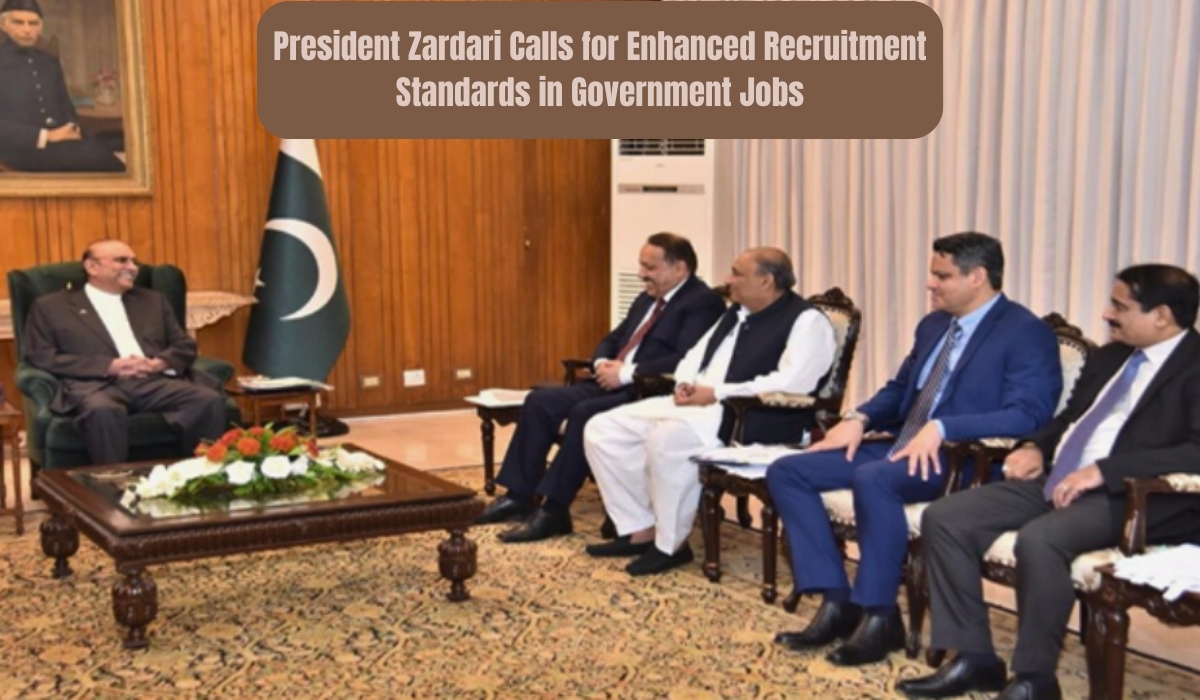President Zardari Calls for Enhanced Recruitment Standards in Government Jobs in 2024

Introduction
President Asif Ali Zardari has called for significant improvements in the recruitment process for government jobs in Pakistan. Speaking to a delegation from the Federal Public Service Commission (FPSC), led by senior member Akbar Hussain Durrani, he emphasized the need for a more inclusive and efficient recruitment system. He highlighted the importance of increasing the quota for women and minorities to ensure their greater inclusion in the mainstream of society. This article delves into the key points of Zardari’s address, the role of the FPSC, and the broader implications of these proposed changes.
Increasing Quotas for Women and Minorities
- Enhancing Inclusion: Zardari stressed the need to increase the quota for women and minorities in government jobs. This move aims to promote their inclusion in various sectors and provide them with more opportunities to contribute to society.
- Promoting Diversity: By increasing these quotas, the government aims to create a more diverse workforce that better represents the demographics of the country.
- Encouraging Participation: This initiative is expected to encourage more women and individuals from minority groups to apply for government positions, thereby enhancing their participation in public service.
Improving the Recruitment Process
- Right Person for the Right Job: He emphasized the importance of selecting the right person for the right job. This involves ensuring that the recruitment process is fair, transparent, and based on merit.
- Efficiency and Transparency: The Zardari’s called for the adoption of modern technology and new methods to make the recruitment process more efficient and transparent. This includes computerized testing to help in the selection of qualified and efficient civil servants.
- Fair Evaluation: The president also highlighted the need for fair evaluation of candidates, particularly those securing high marks during the written examinations. This ensures that deserving candidates are given a fair chance based on their performance.
Role and Responsibility of FPSC
- Recruiting Civil Servants: The FPSC has the crucial responsibility of recruiting civil servants who will play a key role in the administration and governance of the country.
- Improving Service Delivery: Alongside recruitment, the FPSC is also tasked with improving service delivery and promoting good governance in Pakistan.
- Challenges Faced by FPSC: During the meeting, Akbar Hussain Durrani briefed him about the challenges faced by the FPSC in fulfilling its role. These challenges include issues related to the recruitment process and the need for further improvements.
President’s Support and Guidance
- Assurance of Support: Zardari assured the FPSC delegation of his full support and guidance in resolving the issues they face and in improving the recruitment system.
- Collaboration for Improvement: This assurance highlights the president’s commitment to working closely with the FPSC to bring about the necessary improvements in the recruitment process.
Financial Autonomy and Empowerment of Women
Economic Empowerment: Zardari has also been a strong advocate for the economic empowerment of women. He has called for improving women’s access to financial services and credit to encourage women entrepreneurs.
Support from Banks: In a meeting with the Group Chief Executive of the Standard Chartered Bank (SCB), Bill Winters, the president urged banks to support women entrepreneurs and enhance their representation in the banking sector.
Contribution to National Economy: Zardari emphasized that economic empowerment of women would not only strengthen them financially but also uplift their families and contribute to the national economy.
Contributions of Standard Chartered Bank
- SCB’s Role in Pakistan: The SCB delegation briefed he about the bank’s contributions to Pakistan’s economy, the development and evolution of the banking industry, and its role in the socio-economic development of the country.
- Support for Women Entrepreneurs: SCB’s support for women entrepreneurs was highlighted as a key factor in promoting economic empowerment and inclusivity.
Conclusion
Zardari’s call for improving the recruitment process for government jobs, increasing quotas for women and minorities, and enhancing financial autonomy for women reflects a comprehensive approach to promoting inclusivity and good governance in Pakistan. By adopting modern technology and ensuring fair evaluation, the government aims to create a more efficient and transparent recruitment system. The collaboration between the government and financial institutions like Standard Chartered Bank further underscores the importance of economic empowerment and support for women entrepreneurs. These initiatives are expected to have a positive impact on the overall socio-economic development of the country.
References
- ARY News. (Date). President Zardari urges improving recruitment process for govt jobs.
- President House Media Statement. (Date). President Zardari’s Address to FPSC Delegation.
- ARY News. (Date). President Zardari calls for women empowerment, improved access to financial services.
Detailed Analysis and Additional Insights
Background of the FPSC
- Establishment and Mandate: The Federal Public Service Commission (FPSC) was established to ensure merit-based recruitment for civil service positions in Pakistan. It plays a pivotal role in selecting candidates who will serve in various government departments and agencies.
- Role in Governance: The FPSC’s mandate extends beyond recruitment; it is also responsible for ensuring that the selected candidates contribute effectively to governance and service delivery.
Challenges in the Current Recruitment Process
- Manual Processes: One of the key challenges highlighted is the reliance on manual processes, which can lead to inefficiencies and potential biases.
- Transparency Issues: Ensuring transparency in the recruitment process is critical to maintaining public trust. There have been concerns about the lack of transparency in some cases.
- Technological Integration: The adoption of modern technology, such as computerized testing, is seen as a way to address these challenges and improve the overall efficiency of the recruitment process.
Proposed Improvements
- Computerized Testing: The introduction of computerized testing aims to make the evaluation process more objective and efficient. This method can reduce the potential for human error and bias.
- Merit-Based Selection: Emphasizing merit-based selection ensures that only the most qualified candidates are chosen for government positions. This approach aligns with the goal of having the right person for the right job.
- Inclusivity Measures: Increasing quotas for women and minorities is a step towards making the recruitment process more inclusive and representative of the country’s diverse population.
Impact of Increased Quotas
- Women’s Representation: Increasing the quota for women in government jobs can significantly enhance their representation in the public sector. This move is expected to provide more opportunities for women to contribute to governance and public service.
- Minority Inclusion: Similarly, increasing the quota for minorities ensures that these groups are better represented in government positions. This inclusivity is crucial for creating a more equitable and just society.
- Broader Social Impact: The inclusion of more women and minorities in government jobs can have a ripple effect, promoting diversity and equality in other sectors as well.
Financial Empowerment of Women
- Access to Financial Services: Zardari’s emphasis on improving women’s access to financial services and credit is a key component of his broader strategy for economic empowerment. This access is essential for women to start and grow their businesses.
- Role of Banks: Financial institutions, such as Standard Chartered Bank, play a crucial role in supporting women entrepreneurs. By providing credit and other financial services, banks can help women overcome financial barriers and achieve economic independence.
- Economic Contributions: Empowering women financially not only benefits individual women but also has positive implications for their families and the broader economy. Women’s economic contributions can drive economic growth and development.
Standard Chartered Bank’s Contributions
- Economic Support: Standard Chartered Bank has been actively involved in supporting Pakistan’s economy. The bank’s initiatives aimed at promoting financial inclusion and supporting women entrepreneurs are noteworthy.
- Banking Industry Evolution: The bank has also contributed to the evolution of the banking industry in Pakistan, introducing innovative financial products and services that cater to the needs of diverse customer segments.
- Socio-Economic Development: SCB’s efforts extend beyond financial services. The bank is also involved in various socio-economic development projects that aim to improve the quality of life for communities across Pakistan.
Future Directions
- Continued Reforms: The government’s commitment to improving the recruitment process and increasing inclusivity indicates that further reforms are likely in the future. These reforms will be aimed at enhancing the efficiency and effectiveness of the public sector.
- Collaboration with Stakeholders: The collaboration between the government and financial institutions highlights the importance of a multi-stakeholder approach to addressing socio-economic challenges. Such collaborations can lead to more comprehensive and sustainable solutions.
- Focus on Good Governance: Ultimately, the goal of these initiatives is to promote good governance in Pakistan. By ensuring that the recruitment process is fair, transparent, and inclusive, the government aims to build a public sector that is capable of delivering high-quality services to all citizens.
Conclusion
Zardari’s emphasis on improving the recruitment process for government jobs, increasing quotas for women and minorities, and enhancing financial autonomy for women reflects a comprehensive and forward-thinking approach to governance and socio-economic development. These initiatives are expected to have a positive impact on the overall development of Pakistan, promoting inclusivity, efficiency, and good governance.
References
- ARY News. (Date). President Zardari urges improving recruitment process for govt jobs.
- President House Media Statement. (Date). President Zardari’s Address to FPSC Delegation.
- ARY News. (Date). President Zardari calls for women empowerment, improved access to financial services.



2 thoughts on “President Zardari Calls for Enhanced Recruitment Standards in Government Jobs in 2024”